Related Research Articles
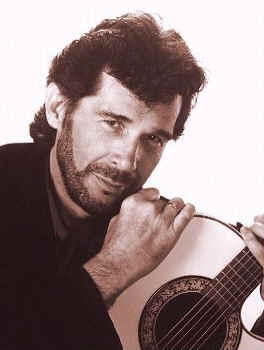
Edward Thomas Rabbitt was an American country music singer and songwriter. His career began as a songwriter in the late 1960s, springboarding to a recording career after composing hits such as "Kentucky Rain" for Elvis Presley in 1970 and "Pure Love" for Ronnie Milsap in 1974. Later in the 1970s, Rabbitt helped to develop the crossover-influenced sound of country music prevalent in the 1980s with such hits as "Suspicions", "I Love a Rainy Night", and "Every Which Way but Loose". His duets "Both to Each Other " with Juice Newton and "You and I" with Crystal Gayle later appeared on the soap operas Days of Our Lives and All My Children.
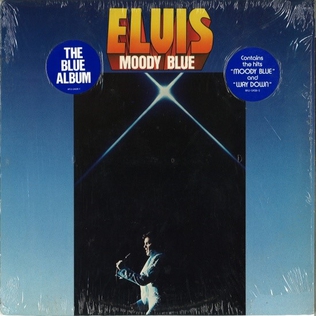
Moody Blue is the twenty-fourth and final studio album by American singer and musician Elvis Presley, released in June 1977 by RCA Records, about two months before his death. The album was a mixture of live and studio work and included the four tracks from Presley's final studio recording sessions in October 1976 and two tracks left over from the previous Graceland session in February 1976. "Moody Blue" was a previously published hit song recorded at the earlier Graceland session and held over for this album. Also recorded at the February session was "She Thinks I Still Care". "Way Down" became a hit after Presley's death less than one month after this album's release. The album was certified Gold and Platinum on September 12, 1977, and 2× Platinum on March 27, 1992, by the RIAA.

"Kentucky Rain" is a 1970 song written by Eddie Rabbitt and Dick Heard and recorded by Elvis Presley. It was recorded at American Sound Studio and features then session pianist Ronnie Milsap. Other musicians on the record include Bobby Wood on piano, Bobby Emmons on organ, Reggie Young on guitar, Tommy Cogbill on bass and Gene Chrisman on drums. The song and session was produced by Felton Jarvis and Chips Moman. It was certified Gold by the RIAA, signifying United States sales of more than a million copies.
"I Really Don't Want to Know" is a popular song written by Don Robertson (music) Howard Barnes (lyrics). The song was published in 1953.
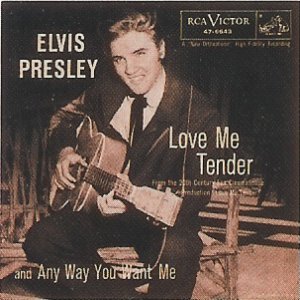
"Love Me Tender" is a 1956 ballad song recorded by Elvis Presley and published by "Elvis Presley Music" from the 20th Century Fox film of the same name. Lyrics are credited to "Vera Matson". The melody is identical to the sentimental Civil War ballad "Aura Lea" and therefore credited to Aura Lea's composer, the Englishman George R. Poulton. The RCA Victor recording by Elvis Presley was No. 1 on both the Billboard and Cashbox charts in 1956.

Elvis in Concert is the live album released by RCA Records in October 1977 in conjunction with the television special of the same name which featured some of the final performances of American singer and musician Elvis Presley. Videotaped and recorded in June 1977, both the special and album were broadcast and released on October 3, six weeks after Presley's death. The album peaked at No. 5 on the Billboard chart in late 1977. It was certified Gold and Platinum on October 14 and 3× Platinum on August 1, 2002, by the RIAA.

Love Letters from Elvis is the 14th studio album by American singer and musician Elvis Presley, released in 1971. The album was critically panned upon release, and failed to crack the top 20 of the Billboard album charts but did reach No. 12 on the US Top Country Albums chart and No. 7 on the UK best-selling albums chart.

The Sweet Inspirations are an American R&B girl group mostly known for their work as backup singers on studio recordings for other R&B and rock artists. A founding member of the group was Dionne Warwick, who was later replaced by her aunt, Cissy Houston.
Dorsey William Burnette III is an American guitarist, singer, and songwriter who was part of the band Fleetwood Mac from 1987 to 1995. Burnette also had a brief career in acting.

Elvis: That's the Way It Is is a 1970 American documentary film directed by Denis Sanders. The film documents American singer Elvis Presley's Summer Festival in Las Vegas during August 1970. It was his first non-dramatic film since the beginning of his film career in 1956, and the film gives a clear view of Presley's return to live performances after years of making films. The film was released simultaneously with Presley's similarly titled twelfth studio album, That's the Way It Is.
"Have I Told You Lately That I Love You?" is a popular song written by Scotty Wiseman for the 1944 musical film, Sing, Neighbor, Sing and performed by Lulu Belle and Scotty. It was their greatest hit and one of the first country music songs to attract major attention in the pop music field. Although the song was featured in the movie, it was not released by Lulu Belle and Scotty until 1947. The first released version of this song was by Gene Autry in 1945.
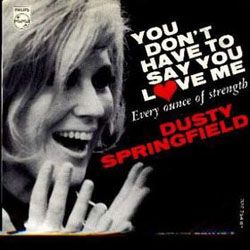
"You Don't Have to Say You Love Me" is a 1966 hit recorded by English singer Dusty Springfield that proved to be her most successful single, reaching number one on the UK Singles Chart and number four on the Billboard Hot 100. Elvis Presley recorded a cover version in 1970 which was a hit in both the US and the UK. Other covers have charted in the UK, Ireland, Italy and Finland.
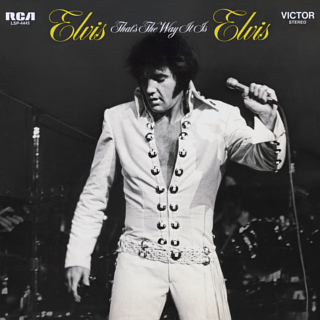
That's the Way It Is is the 12th studio album by American singer and musician Elvis Presley, released on RCA Records, LSP 4445, in November 1970. It consists of eight studio tracks recorded at RCA Studio B in Nashville, and four live in-concert tracks recorded at The International Hotel in Las Vegas. It accompanied the theatrical release of the documentary film Elvis: That's the Way It Is, although it is not generally considered a soundtrack album. The album peaked at number 21 on the Billboard 200 and at number eight on the country chart. It was certified Gold on June 28, 1973, by the Recording Industry Association of America and up-graded to Platinum, for sales of a million copies on March 8, 2018.
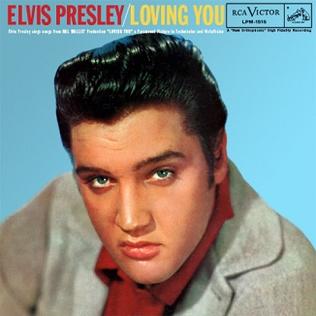
Loving You is the first soundtrack album by American rock and roll singer Elvis Presley. It was released by RCA Victor in mono, LPM 1515, in June 1957 to accompany his first starring film, Loving You (1957). Recording sessions took place on January 15, 16, 17, and 18, 1957, at the Paramount Pictures Scoring Stage, and on January 12, 13, 19, and February 23 and 24, 1957, at Radio Recorders in Hollywood. These are the first sessions where Steve Sholes is officially listed as producer. It spent ten weeks at No. 1 on the Billboard Top Pop Albums chart. It was certified Gold on April 9, 1968 by the Recording Industry Association of America.
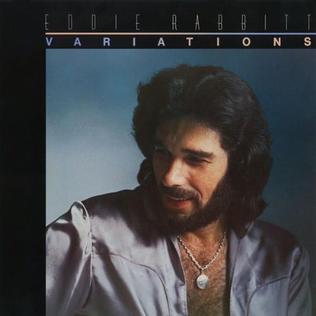
Variations is the fourth studio album by American country music artist Eddie Rabbitt. It was released in 1978 under the Elektra Records label. The album produced three singles: "Hearts on Fire", which peaked at number two on the country charts, and two country number one hits: "You Don't Love Me Anymore", which also peaked at 18 on Adult Contemporary charts; and "I Just Want to Love You". "Kentucky Rain", a song co-written by the artist and originally recorded by Elvis Presley in 1970, was also included on the album.
Rory Michael Bourke (born July 14, 1942 in Cleveland, Ohio is an American country music songwriter and music publisher.
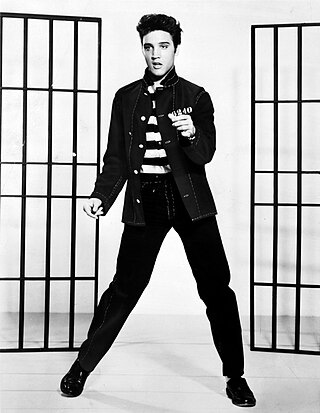
The singles discography of Elvis Presley began in 1954 with the release of his first commercial single, "That's All Right". Following his regional success with Sun Records, Presley was signed to RCA Victor on November 20, 1955. Presley's first single with RCA, "Heartbreak Hotel", was a worldwide hit, reaching the No. 1 position in four countries and the top 10 in many other countries. Other hit singles from the 1950s include "Don't Be Cruel", "Hound Dog", "Love Me Tender", "Too Much", "All Shook Up", "(Let Me Be Your) Teddy Bear", "Jailhouse Rock", "Don't", "Hard Headed Woman" and "A Big Hunk o' Love". On March 24, 1958, Presley entered the United States Army at Memphis, Tennessee, and was stationed in Germany. He left active duty on March 5, 1960.
"Any Way You Want Me" (sometimes titled "Anyway You Want Me" and "Any Way You Want Me (That's How I Will Be)") is a song written by Aaron Schroeder and Cliff Owens and originally recorded and released by Elvis Presley. Presley's recording reached number one on the U.S. Billboard's Most Played in Jukeboxes chart (as a double A-side with "Love Me Tender").
"Pieces of My Life" is a song written by Troy Seals. It was originally recorded by Charlie Rich and appeared on his 1974 album The Silver Fox.
"The Next Step Is Love" is a song written by Paul Evans and Paul Parnes and originally recorded by Elvis Presley.
References
- 1 2 3 4 "You Don't Have To Say You Love Me". Elvis Presley official website "Elvis the Music". Retrieved 2020-02-15.
- 1 2 3 4 "Cover versions of Patch It Up by Elvis Presley". SecondHandSongs. Retrieved 2021-02-11.
- 1 2 "Elvis – You Don't Have To Say You Love Me / Patch It Up (Indianapolis Pressing, Vinyl)". Discogs . October 1970. Retrieved 2021-02-11.
- ↑ "Elvis Presley". Billboard .
- 1 2 "That's The Way It Is". Elvis Presley official website "Elvis the Music". Retrieved 2020-02-15.
- ↑ Tanya Dalziell; Karen Welberry (13 May 2016). Cultural Seeds: Essays on the Work of Nick Cave. Routledge. pp. 153–. ISBN 978-1-317-15625-3.
- ↑ "Elvis Presley Chart History (Hot 100)". Billboard. Retrieved 2019-01-16.